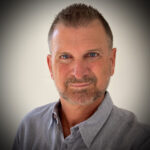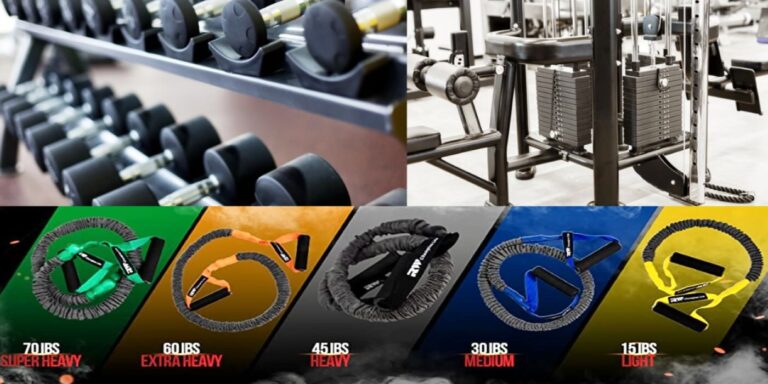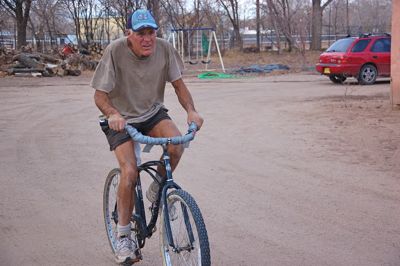 Chuck Hosking, a strong advocate for global equity and former math teacher, takes life in a different stride than most Americans today; he sees life as a “spiritual long distance race.” Being a long distance runner for forty years, his age does not slow him down. His life profession is to strive for global equity in the world: “I believe in a God that loves everyone equally and likes to see the benefits of His creation distributed equally. My wife and I tried to center our lives on structures that didn’t kept inequities in place. For self-respect, we wanted to live our personal lives in a way that reflected our faith values.” Because of this, he lives in the lowest income neighborhood in Albuquerque, New Mexico, with specific house rules. He does not allow anything in the house that costs more than $20.00 (with the exception of his refrigerator), all doors remain unlocked at all times, there is no heating or air conditioning, and there is no technology (computers, televisions, etc.) that is deigned for the globally elitist and promotes a sedentary lifestyle. He has done his research, and noted that everyone’s global fair share per year is $1,500.00. It is his goal to live on this amount per year.
Chuck Hosking, a strong advocate for global equity and former math teacher, takes life in a different stride than most Americans today; he sees life as a “spiritual long distance race.” Being a long distance runner for forty years, his age does not slow him down. His life profession is to strive for global equity in the world: “I believe in a God that loves everyone equally and likes to see the benefits of His creation distributed equally. My wife and I tried to center our lives on structures that didn’t kept inequities in place. For self-respect, we wanted to live our personal lives in a way that reflected our faith values.” Because of this, he lives in the lowest income neighborhood in Albuquerque, New Mexico, with specific house rules. He does not allow anything in the house that costs more than $20.00 (with the exception of his refrigerator), all doors remain unlocked at all times, there is no heating or air conditioning, and there is no technology (computers, televisions, etc.) that is deigned for the globally elitist and promotes a sedentary lifestyle. He has done his research, and noted that everyone’s global fair share per year is $1,500.00. It is his goal to live on this amount per year.
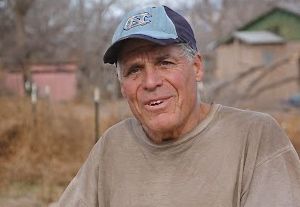 Ninety-seven percent of his costs of living last year went to property taxes and utilities, and all other expenses (food, entertainment, transportation, etc.) totaled $45.00! He recycles all of the water used in the house, had his gas shut off last year, rides his bike everywhere, and salvages all his food from local dumpsters. Not only does he use the food he finds, he also distributes ninety percent of that food within ten households in his neighborhood. He pays cash for everything and has no debt. His wife died after a happy thirty-six years of marriage, and now he lives his life as a tribute to her, a woman who shared his same simplistic values enforcing global equity. He lives every day in service to others.
Ninety-seven percent of his costs of living last year went to property taxes and utilities, and all other expenses (food, entertainment, transportation, etc.) totaled $45.00! He recycles all of the water used in the house, had his gas shut off last year, rides his bike everywhere, and salvages all his food from local dumpsters. Not only does he use the food he finds, he also distributes ninety percent of that food within ten households in his neighborhood. He pays cash for everything and has no debt. His wife died after a happy thirty-six years of marriage, and now he lives his life as a tribute to her, a woman who shared his same simplistic values enforcing global equity. He lives every day in service to others.
While most church tithing regimens recommend giving ten percent of your income back to the community, Chuck has taken it upon himself to develop a lifestyle that allows him to flip this fraction and give ninety percent back. Last year, he lived on a mere seven percent of his income. He would argue the term “giving back” because in his eyes, the money does not belong to him in the first place – it belongs to the global commons: “All wealth in the world emanates from natural resources, which came from God, and I did not ‘earn’ it, it is a gift. There are so many gifts in my life, and they are from God. It is a myth to say I earned any of these or earned any of the money that comes to me. I give all my money away, as I am returning the stolen goods to their rightful owners. The structures of oppression in society are structured to have wealth given to countries dying to their own opulence. To return the stolen goods is not an act of magnanimity but an act of justice.”
He also enjoys a fifty-mile “bike and hike” once a week, along with daily workout routines that allow for deep thought and prayers, which he engages in three to four times per day. Along with working part time now at a community college taking notes for students with disabilities, he spends his time helping local farms, planting gardens, cutting down trees, and holding peace vigils outside Sandia National Laboratories, a lab that helps build weapons of mass destruction for the national defense. For the past thirty years, he has spent time every afternoon with his banner outside this lab. His thoughts for this mimic his idea of Jesus’ philosophy of peace. He states, “I am out there with banners, no matter the weather, to introduce the thought that there might be a conflict between faith values and the weapons. My questions force people to think. Jesus said love your enemies. Do we? What would Jesus do in terms of dealing with enemies around the world? It is more courageous to stand up without weapons, unarmed. That takes real courage. My feeling is that until those of us who are serious about bringing about Jesus’ way of confronting evil, we need to take the same sacrifices of those enduring war, or people wont take us seriously.” Even though some workers disagree with him, he has earned his stripes and their respect through his perseverance and determination in this cause. He works for peace and justice in the world. Through years of running and the endless energy he still possesses, he has stamina. He tries to harness this energy to bring about God’s will in the world.
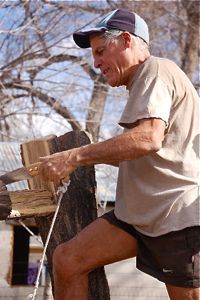 He considers his great genes as a gift from God and wants to try to hold up his half of that. There is a Bible passage where someone asks Jesus to sum up what he is about, and Jesus says, “Revere God and love your neighbor.” He reveres God by showing gratitude for his genes by maintaining them. He has developed a concept he calls “spiritual plaque.” This is how he explains it: “I view God’s goodness and love as a font that is endless to any of us, and we act as pipes, or conduits, of this love. If our pipes are filled up with spiritual plaque, God’s goodness and love doesn’t flow as smoothly. Monetary wealth is [an example of] a plaque. I also want to try to keep my bodily arteries free of plaque. Exercise is important so I am not taxing my body. I like to view my body as an ally, not an adversary. Fitness gives me more energy to serve other people.” He encapsulates this Bible verse in every aspect of his life. Whether he is dumpster diving for food for his neighborhood, helping local farms, or living minimally, he is keeping his spiritual pipes free of those things that are seen as encumbrances between him and God. Living on $5.00 a day and using physical fitness to bring clarity to his mind and body, he lives a life of service, a life that is courageous, and a life that can be deemed an example of MC.
He considers his great genes as a gift from God and wants to try to hold up his half of that. There is a Bible passage where someone asks Jesus to sum up what he is about, and Jesus says, “Revere God and love your neighbor.” He reveres God by showing gratitude for his genes by maintaining them. He has developed a concept he calls “spiritual plaque.” This is how he explains it: “I view God’s goodness and love as a font that is endless to any of us, and we act as pipes, or conduits, of this love. If our pipes are filled up with spiritual plaque, God’s goodness and love doesn’t flow as smoothly. Monetary wealth is [an example of] a plaque. I also want to try to keep my bodily arteries free of plaque. Exercise is important so I am not taxing my body. I like to view my body as an ally, not an adversary. Fitness gives me more energy to serve other people.” He encapsulates this Bible verse in every aspect of his life. Whether he is dumpster diving for food for his neighborhood, helping local farms, or living minimally, he is keeping his spiritual pipes free of those things that are seen as encumbrances between him and God. Living on $5.00 a day and using physical fitness to bring clarity to his mind and body, he lives a life of service, a life that is courageous, and a life that can be deemed an example of MC.
